

Announcing the new CC Search, now in Beta. Creative Commons’ goal is a vibrant, usable Commons powered by collaboration and gratitude. That work has taken us beyond the licenses to explore new tools for discovery, reuse and collaboration. We’re releasing CC Search today and inviting users to try out the beta, including our list-making features, and simple, one-click attribution to make it easier to credit the source of any image you discover. One of the primary ways that our users find Creative Commons content is through our search page, which provides references to various repositories.
The current CC search tool is accessed by nearly 600,000 people every month — but we can do better. There is no “front door” to the commons, and the tools people need to curate, share, and remix works aren’t yet available. Money, blockchains, and social scalability. Introduction Blockchains are all the rage.
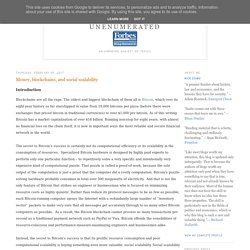
The oldest and biggest blockchain of them all is Bitcoin, which over its eight-year history so far starshipped in value from 10,000 bitcoins per pizza (before there were exchanges that priced bitcoin in traditional currencies) to over $1,000 per bitcoin. As of this writing Bitcoin has a market capitalization of over $16 billion. Running non-stop for eight years, with almost no financial loss on the chain itself, it is now in important ways the most reliable and secure financial network in the world. The secret to Bitcoin’s success is certainly not its computational efficiency or its scalability in the consumption of resources. Instead, the secret to Bitcoin’s success is that its prolific resource consumption and poor computational scalability is buying something even more valuable: social scalability. Cognitive capacity – here in the form of the relative size of a species’ neocortex – set limits on how large primate groups can be.
7 Tips for Listing MOOCs on Your Résumé. Professional Development 7 Tips for Listing MOOCs on Your Résumé Here's how to put your massive open online course experience to best advantage when documenting your skills.
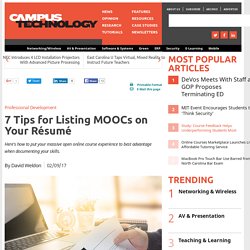
By David Weldon02/09/17 Eight short years ago, the world's first massive open online course (MOOC) was offered by the University of Prince Edward Island (Canada). The course, called "Connectivism and Connective Knowledge," attracted 25 paying students and another 2,200 online students from the general public who paid nothing to sit in. Course materials were made available through RSS feeds, and online students participated through various collaboration tools, blog posts and threaded discussions. Fast forward to today, and it seems like every college and university has a MOOC offering — or several — or wishes that they did. That's certainly the hope of Richard DeMillo, founder and director of Georgia Tech's Center for 21st Century Universities. Georgia Tech is doing just that. New textbook technology creates wins for students and publishers. Dive Brief: Several prominent textbook publishers are finding new ways to save students money and stabilize revenues with inclusive access digital material models funded by fees included in student material fees.Under the new model of bookselling, students receive digital access to required course materials and have the option to pay additional money for a printed copy, delivered on the first day of class.
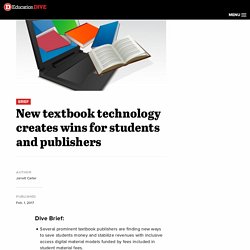
Officials at Indiana University told Inside Higher Ed that in the eight years since piloting its eText initiative, revenues exceeded $10 million last year and there was a more than 40% jump in annual growth. Dive Insight: Textbooks were the impetus for college campuses rethinking standard operations for the campus bookstore and mailroom, all done in the name of saving students money. Get Smarter in 2017. Here are 10 Places to Educate Yourself Online (for Free) What do you want to learn more about this year?
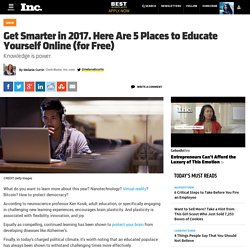
Nanotechnology? Virtual reality? Bitcoin? How to protect democracy? According to neuroscience professor Ken Kosik, adult education, or specifically engaging in challenging new learning experiences, encourages brain plasticity. Equally as compelling, continued learning has been shown to protect your brain from developing diseases like Alzheimer's. Once thought to be a fad, MOOCs showed staying power in 2016. Dive Brief: EdSurge profiles the growth of massive online open courses in 2016, which attracted more than 58 million students in over 700 colleges and universities last year.
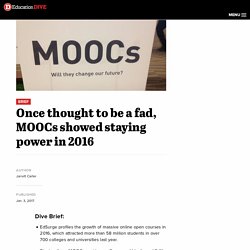
The top three MOOC providers — Coursera, Udacity and EdX — collectively grossed more than $100 million last year, as much of the content provided on these platforms shifted from free to paywall guarded materials. Australian university to offer advanced degrees via MOOC platform. Dive Brief: Australia's Deakin University will launch several new postgraduate degrees next year by way of Massive Open Online Courses (MOOCs), and will offer students a free two-week pilot to acclimate to the program.
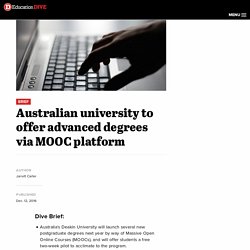
One of Australia's first institutions to offer distance learning, Deakin will offer specialized degrees in social service, finance and healthcare, at a cost of about $2,000 for each set of subject content. Why education continues to fail digital content (and students ready to embrace it) In her opinion piece for No Shelf Required, CEO of Metrodigi, Kathryn Stewart, gives three reasons why education has been slow to leverage the benefits of digital content: inferior user experience; shortage of engaging content; and lack of commitment to overcome institutional barriers.
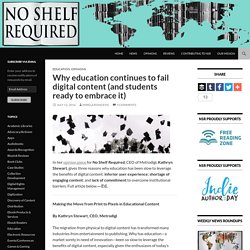
Full article below. —Ed. Facebook offers free education software in US - BBC News. Image copyright Facebook Facebook has taken its first steps into the education market with software that it claims allows children to learn at their own pace.
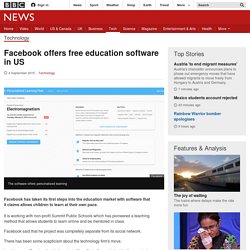
It is working with non-profit Summit Public Schools which has pioneered a teaching method that allows students to learn online and be mentored in class. Facebook said that he project was completely separate from its social network. There has been some scepticism about the technology firm's move.
MOOCs & Academia. MOOC Negatives. MOOCs & Europe. MOOC FAQ. Videos on MOOCS.